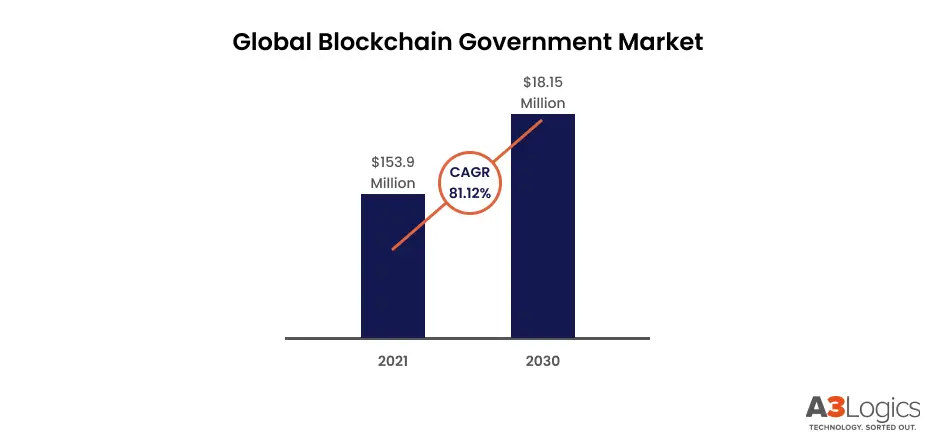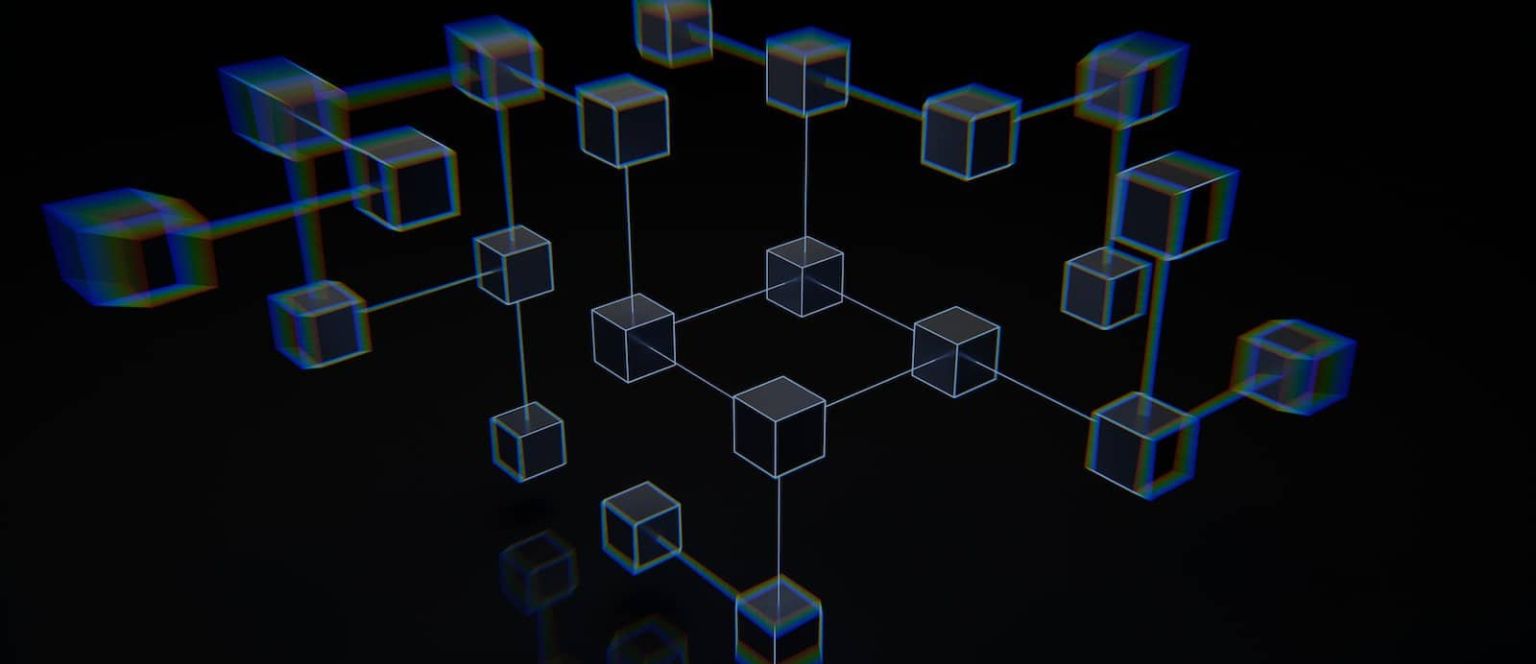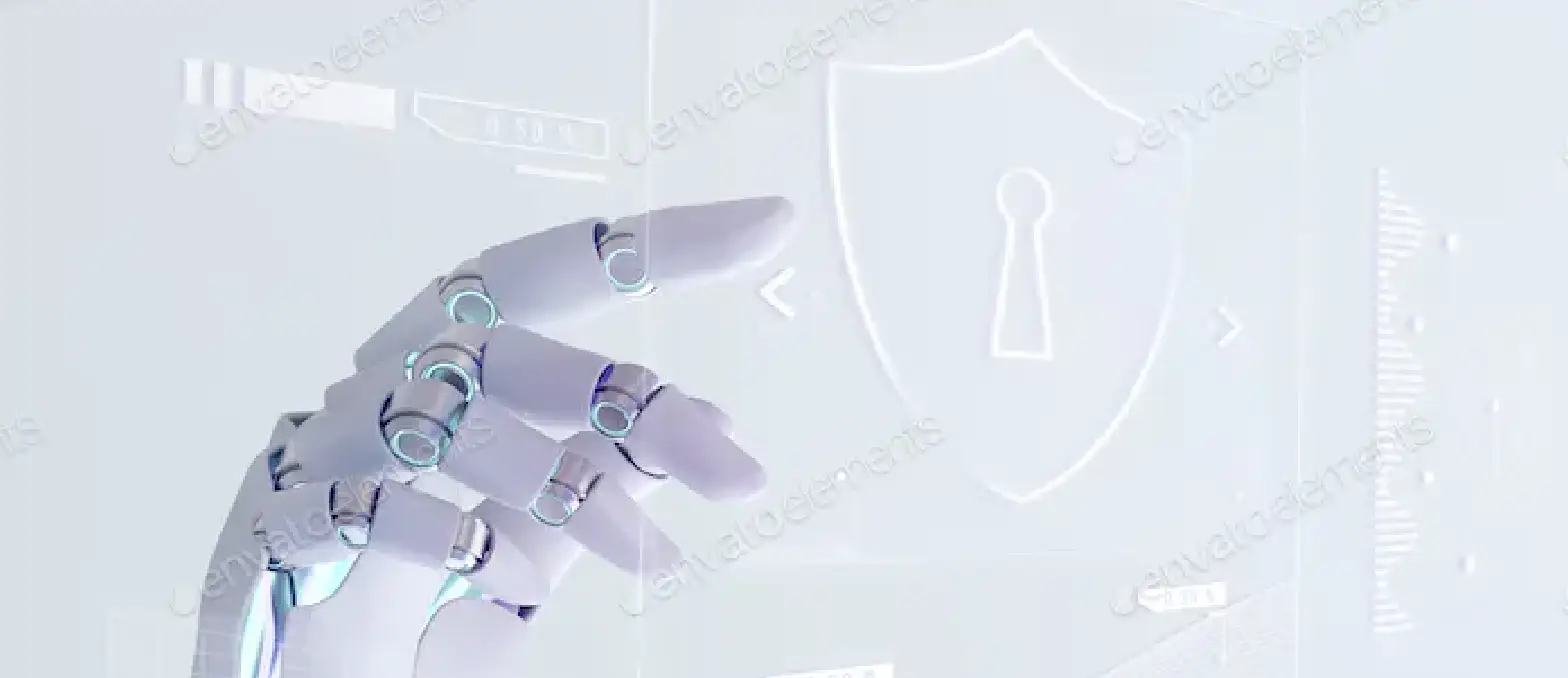Table of Contents
Blockchain-based government and the public sector are building at a large scale. The technology accelerates government functions including verification, secure transactions, land registry, and keeping public records safe. Blockchain technology has enhanced government efficiency and transparency by cutting costs, blockchain-based survey systems, accurate fundraising, etc.
The blockchain market is constantly growing, with the value estimated from $7 Billion to more than $94 billion by 2027, i.e., CAGR growth of 66.2%. So, let us now check out the blog to get detailed information about blockchain use cases in government, benefits, and challenges as well.
Blockchain in Government: Market Overview
The size of the global blockchain market shows a growth in 2020, which is estimated to grow increasingly till the next decade. Here are some interesting statistics related to blockchain in government sector.
- In 2020 North America contributed 46% of the growth in the global market for blockchain technology. Organizations in government adopted blockchain technology that contributed to the increase in the US as well as Canada.
- Blockchain solutions are used worldwide and are expected to hit $17.9 billion before 2024. It will rise at an annual rate of compound annual growth (CAGR) that is 46.4%.
- Bitcoin is the current highest-priced cryptocurrency. A single coin worth over $55,000 at the time of its February 2021 release. In this regard, Bitcoin is being dubbed the future currency.
- Experts have predicted that blockchain technology will increase world GDP to $1.76 trillion by 2030. This is equivalent to 1.4% of the world’s GDP.
- The market for blockchain grew by 10.27% in 2020. The world’s blockchain industry is anticipated to increase between $3 billion by 2020, and $39.7 billion in 2025.
Real-World Use Cases of Blockchain in the Government and Public Sector
A state that relies on blockchain technology may make it easier to manage trusted data. The state could manage this while securing against data access by unauthorized persons and manipulation.
Blockchain technology has many advantages that could benefit the government. The following are the blockchain use cases in government, check them out below.
Blockchain-Based Voting Systems
Applications of Blockchain in Government aren’t restricted only to financial transactions. It can also be employed to manage all kinds of information. For example, people can vote with e-voting machines, which keep track of information on the blockchain.
With encryption and decentralization, this distributed ledger is unbreakable, pseudonymized, and auditable. As it isn’t in one place, no one party can interfere with or disrupt the network.
Blockchain-based voting is superior to mail-in ballots. Because the network is highly secure, it can prevent election fraud. In contrast to traditional vote counting, which could take weeks for results, blockchains can be completed in a matter of minutes or even seconds without any margin for errors.
Blockchain-Based Survey Systems
One of the prominent Blockchain Use Cases in Government is the blockchain-based survey application that uses smart contracts built on the blockchain platform to create a centralized and transparent survey method. Participants sign up via the blockchain platform to participate in the survey, and their responses are recorded on the blockchain in a decentralized, immutable manner.
The smart contract automatically ends the poll and computes results that are then confirmed by anyone connected to the network. Rewards promised to users to participate during the poll are immediately transferred into their wallets through the Blockchain platform. This method assures transparency and eliminates the possibility of manipulation or fraud.
Land Title and Property Registries
There needs to be more transparency. The investor market has many disconnected parties that rely upon manual processes. The significant barrier to investor entry has led to fewer investors and more expensive assets.
The Department of State Land Registry uses blockchain technology to serve different goals. These include controlling the owner registry and administering the registry.
Applications of blockchain in government sector offers everyone an exact record of the ledger shared between all parties. Blockchain-based land registration systems can be utilized to create a digital token to represent property ownership.
The technology enhances the land registry industry by eliminating multiple layers of costs and friction. Blockchain use cases in government also help reduce the time required for verification and provide greater flexibility to modular products.
Welfare and Social Benefit Distribution
Social welfare and protection have a crucial role in the modern world, which is characterized by social inequality. While the two terms are frequently used in conjunction, they have distinct definitions. Social welfare is a term used to describe the general well-being of individuals in society. It encompasses all services that aim to assist people in need.
At the same time, social protection concentrates on aiding those who are vulnerable and are facing severe risks like unemployment, poverty and diseases. For Social security, blockchain technology could be utilized to eliminate the need for governmental transfers to citizens and transform how social policies are implemented because of its security and transparency when managing transfers.
Taxation and Revenue Collection
One area of blockchain use cases in government is taxation. Academics and experts agree that blockchain can solve some of the taxation system’s flaws. For example, in the case of VAT payments, blockchain could be used to establish a registry of electronic invoices, enabling tax authorities and the Tax Administration to see and ensure that taxes are paid every time an item is sold.
A taxpayer could, for example, upload invoices electronically to a system for reporting. The invoices will be checked and then uploaded to blockchain-based networks. This type of system can enable greater automation and establish a history of transactions. It would also allow more accessibility and detection of fraud and errors.
Discover How Blockchain Can Transform Governance
Public Records Management
Real estate requires a clear interface that records can be maintained as well as stored and used whenever needed. Verification of documents is an important component of the process. Applications of blockchain in government is a security, transparency and verifiable method for real estate transactions. It grants complete ownership rights to buyers of land while guaranteeing the security and integrity in every form. Because everything is recorded in the Blockchain, data is traceable by all parties who are involved. Utilizing smart contracts and digital signatures ensures that the deal is honest.
A3Logics is among the initial SaaS providers for the real estate sector. The service is built on top of blockchain, which makes it a highly secure record-keeping service. No central authority is involved in the process, and the customers gain complete ownership of the property following the trade.
Energy and Utility Management
Many scenarios for DLT in sustainability and energy are less well-known than instances of use in other industries. Many research studies and projects are in progress, and they have different focuses. Public agencies have already acknowledged the potential advantages.
For instance, The German BMWi (Federal Minister of Energy and Economic Affairs) states that blockchain technology can enhance the efficiency of existing energy processes and practices. They can also speed up the development of IoT platforms and digital applications. They also bring innovation to P2P energy trading and decentralised generation. Furthermore, they claim that blockchain technology has the potential to dramatically improve the practices of energy companies and utility companies by enhancing internal processes, customer service, and cost.
Public Safety and Law Enforcement
Blockchain use cases in government especially within law enforcement are many. From ensuring data integrity to quickly uncovering crimes. Blockchain records are immutable, and they can identify criminals trying to create false identities. They also allow secure information sharing.
One of the most significant blockchain use cases in government that it can bring to policing is chain evidence. In a chain of evidence, blockchain records every single event and detail (police body camera footage, arrest information, police reports, etc.) in sequential order and with timestamps. This creates an extensive timeline of incidents. Since the information is undisputed and reliable, courts and investigators can utilize it to piece together legitimate evidence for trial.
Authorities can also use the chain of evidence to aid in more effective crime detection, particularly in the financial industry. If someone tries to conceal their identity or gain access to economic data, the blockchain will detect the fraudulent act and alert authorities.
Smart Contracts for Government Services
Smart contracts form the basis of decentralized finance (DeFi) as they’re algorithms that operate in a sequence when predetermined conditions are fulfilled. A DeFi development company plays a crucial role in creating these smart contracts, enabling automated, transparent, and secure financial transactions. Blockchain in government can also provide easier access to public information. Information shared on the blockchain is governed by four basic principles: it is available to everyone by default, easily accessible, understandable, and interoperable.
Applications of blockchain in government and the public sector will enhance efficiency and increase citizen involvement. Blockchain technology can also simplify the administration of public affairs.
Intellectual Property Protection
With its permanent, timestamped, and immutable records of inventions, copies, patents, and other copyrights, Blockchain is a fantastic solution to safeguard intellectual property rights.
Applications of blockchain in government sector makes it easier to secure and transparently identify intellectually protected assets, guaranteeing proper attribution and stopping unauthorized usage or violation.
Disaster Relief and Aid Distribution
Changes in the climate over the last few years have made natural disasters more frequent. Research has shown that blockchain technology offers unique capabilities for quick responses to natural disasters, whether the cause is an earthquake or the risk of spreading illness.
In the end, a secure, reliable, and secure communication infrastructure is one of the key elements in disaster response. Thanks to the blockchain use cases in government sector, it can tackle significant challenges in disaster response, such as coordination, communication, rebuilding trust, and maintaining security.
Immigration and Border Control
Experts have pointed out that DLT, when combined with SSI solutions, could be a great way to aid refugees and forced migrants. According to the United Nations, there are more than 30 million refugees worldwide. Proving their identity and identity is difficult, as is demonstrating their skills or experience.
SSI solutions and decentralized, immutable blockchain networks offer new options to issue authentic digital identity credentials and authentic digital certificates for professionals. Researchers have already suggested systems using blockchain technology to produce secure, decentralized, and scalable migration records for people. This can help verify illegal immigration and determine if a person can reach their intended destination.
Asset Management for Public Infrastructure
Asset Management is one of the biggest blockchain use cases in government sector. Blockchain is a major factor in the world of finance and is similar to asset management. In a broad sense, asset management refers to the management and exchange of various assets individuals may own, including real estate, fixed-income equity commodities, mutual funds, and other investment alternatives.
The regular trading process in asset management could be extremely costly, especially when the transactions involve several countries and cross-border payments. Blockchain can significantly help in these instances by eliminating the need for intermediaries, such as brokers, custodians, settlement managers, brokers, etc. Instead, Blockchain ledges provide an easy and clear procedure that eliminates the chance of errors.
Food Safety and Supply Chain Monitoring
One of the biggest problems ensuring food safety that various stakeholders are identifying is the inefficiency of tracking food production. For instance, the traditional methods used to supply food make tracing the source of contamination or disease for animals extremely difficult and time-consuming.
Numerous experts are promoting Applications of blockchain in government as a solution. It can digitally digitize secure transactions at each step of the food supply chain, making them accessible to anyone with access to the blockchain ledger. Smart contracts can decrease the number of middlemen, reducing transaction costs and increasing margins. They can also improve efficiency, consequently giving more of the profits to the farmer or producer.
DLT is in research connected explicitly to creating the Internet of Things (IoT). IoT can help monitor the quality of products, environmental conditions and traceability of products for food items. Alongside the traceability of the supply chain, Blockchain solutions can also help facilitate the faster processing of payment, licensing, and distribution of electronic coupons to purchase food items or prevent mislabelling of food items.
Digital Identity Verification
Identity management is an essential component of governmental services. However, traditional tools for managing data do not provide secure, quick access or a scalable identity. Blockchain-based identity management provides individuals with the possibility of a self-sovereign identity. That means citizens are in control of access to their IDs, but the information inside can be verified instantly.
For instance, a police officer scans a person’s ID to verify her name, particularly the city of residence, but without divulging any other information that could be considered sensitive. With a secure and verified digital identity, access to government services is significantly streamlined. Blockchain-based self-sovereign digital IDs could be the foundation for various other initiatives.
Public Health & Safety
Applications of blockchain in government can provide secure and interoperable health information management systems.
Medical histories, patient records and test results may be stored on blockchain, which ensures security, integrity and management of consent.
In addition, blockchain can facilitate effective healthcare coordination. This could, in turn, aid in improving research capabilities and improve outcomes.
Why Should Governments Use Blockchain Technology?
Based on the results of the search, here are the main advantages and benefits of blockchain technology, as well as the motives for governments to consider the use of blockchain technology:
Cost Reduction: Blockchain-based solutions can automate and improve processes while reducing operational costs and improving efficiency in areas like land registration, purchasing, and supply chain management.
Decentralized Governance: Blockchain enables decentralized decision-making and participation, which allows citizens to be more involved in the government process and encourages an inclusive democracy.
Data Security: Blockchain’s cryptographic methods and distributed ledger technology provide secure storage of data and transactions that are not tamperproof, securing citizens’ sensitive public information and data.
Enhances Transparency: Blockchain’s transparent and immutable ledger is one source of truth that makes it simpler for citizens to keep track of government actions and decisions, improving accountability and decreasing corruption.
Scalability: Blockchain technology can handle vast volumes of transactions and data and is therefore suitable for wide use in processes and government services.
Building Trust: Blockchain’s decentralized, transparent, and open nature can help rebuild trust in government institutions, especially in areas where corruption or inefficiency are commonplace.
Citizen-Centric Services Blockchain-based solutions provide paper-free, decentralized, and tamperproof applications, such as identity management, benefit distribution, and health records, enhancing citizens’ overall experience.
Improved Interoperability: Blockchain’s standard protocols allow seamless data exchange and integration with various government agencies and systems, enhancing coordination and cooperation.
To fully appreciate Blockchain technology’s potential in the government, officials must focus on the following:
- Recognizing areas where trust in society needs to be increased.
- Establishing the technology development and implementation framework focusing on security, governance and cost/duration indicators.
- Exploring blockchain-based applications for various government functions and processes.
- Gaining a thorough understanding of blockchain’s capabilities as well as its limitations.
With the help of applications of blockchain in government, agencies can improve their business practices, increase efficiency and transparency, and ultimately better serve citizens.
What are the Benefits of Blockchain in Government and Public Sector?
Blockchain transforms how the government functions by establishing an infrastructure that guarantees data accuracy and accountability while fostering a culture of openness and trust between government officials and their constituents. Blockchain brings several advantages in the delivery of services provided by the government:
Accuracy of the Chain
A multitude of devices and computers validate the transactions on the blockchain network. This means that almost everyone is removed from verification processes, resulting in fewer human errors and a more exact data record. If a computer connected to the network made an error in computation, the error could be limited to one version of the blockchain and would not be recognized by all the other networks.
Transparency
A lot of blockchains are open-source. This means that anyone can examine the code. Auditors can examine cryptocurrencies such as Bitcoin to ensure security. But this also means there isn’t any actual authority over who is in charge of Bitcoin’s software or how it is modified. This means that anyone can propose improvements or changes to the Bitcoin system. If a majority of Bitcoin users think that the latest version of the code that has the update is safe and worthy, Bitcoin can be upgraded.
Cost Reductions
Typically, consumers pay an institution to confirm the transaction or have a notary public to sign documents. Blockchain eliminates the requirement for verification by a third party and, in turn, their associated cost. For instance, businesses pay a modest fee to accept credit card transactions since payment processors and banks are required to process the transactions. On the contrary, Bitcoin has no central authority and only has a small transaction fee.
Efficient Transactions
Transactions made by a central authority could take a couple of days to settle. If you try to deposit an unpaid check on a Friday night, for example, it could take a while to see your funds on Monday. Financial institutions are open during normal business hours, typically all week long. But blockchains are available all day, seven days a week, all year long.
Certain blockchains allow transactions to be completed and deemed safe in minutes. This is particularly beneficial for trades that cross borders, which typically take longer due to problems with time zones and the fact that both parties have to verify payment processing.
Decentralization
Blockchain cannot save any of its data in a central place. Instead, it is replicated and distributed across a computer network. Each time a new block is made available to the blockchain, each computer in the network updates its blockchain to reflect this change.
Because information is spread over the Internet instead of kept in a single large database, the blockchain can be much more difficult to interfere with.
Challenges of Implementing Blockchain in Government and Public Sector
Implementing blockchain in government is a huge opportunity, but not without difficulties and issues. To fully reap the benefits of blockchain technology in public administration, government agencies must overcome various obstacles, including security issues and integration, scalability, and regulatory concerns.
Security and Privacy Concerns
One of the most difficult issues when implementing blockchain in government services is privacy and security. While blockchain is designed to protect data, the human component is vulnerable.
Inappropriate access to personal keys or a weakness in security protocols can harm the security system. Finding a balance between data transparency and personal privacy is vital, especially when it comes to healthcare services and identity verification.
Scalability
Blockchain networks, specifically Bitcoin and Ethereum, have scalability concerns. Since government services require an enormous number of transactions, the existing blockchain infrastructures could struggle to manage the magnitude of the operations. Solutions for scaling are necessary to ensure that blockchain will be able to meet the needs of the public administration.
Integration with Legacy Systems
Many governments depend on outdated IT systems that have been in use for a long time. Integrating blockchain into these systems presents a significant issue. Older systems are often isolated, and data is stored in obsolete methods and formats. Making the switch to a blockchain-based platform is a complicated and expensive process. Governments must consider bringing these technologies in line without affecting essential services.
Regulatory and Legal Challenges
Blockchain technology is challenging the current legal and regulatory frameworks. Smart contracts, for example, can raise questions regarding the legality of enforceability and liability.
The government must be able to change and develop new regulations to take advantage of the latest technologies. The regulations surrounding cryptocurrency and Initial coin offerings (ICOs) are in flux, and governments need to provide clear guidelines to their businesses and citizens.
Education and Training
The success of implementing blockchain in government services requires a highly trained workforce. Government employees need to be knowledgeable about how blockchain works and its capabilities and know how to operate and maintain systems based on blockchain. The provision of the required training and education is a crucial factor in ensuring that the technology is successfully used.
Why Choose A3Logics for Blockchain Solutions in Government and Public Sector?
It is a proven fact that, in a time when the world’s trust in the government is at a low level, a system based on honesty and transparency has immense potential for shaping a country’s economics.
We have witnessed the potential blockchain technology has; we should not forget the rules that are hindering its growth.
A future in which the government is sufficiently decentralized to be a citizen-centric entity could be possible or impossible, depending on how the government responds to decentralization and how transparently it incorporates blockchain technology, known as public ledger, in its operations.
Unlock Blockchain’s Potential in Government – Book A 30 Minutes Free Consultation!
Conclusion
Blockchain development services have enormous potential to revolutionize the government sector because it increases transparency and efficiency and allows the secure management of data.
Although the use of blockchain for government is still in its beginning stage, several instances have already proven promising outcomes.
As governments continue to research ways to invest in and develop this revolutionary technology. We are likely to see more efficient and affluent public services soon.
At A3Logics, the best smart contract development company, we believe that blockchain technology is among the major technologies that are changing the world for the better. This is why we are constantly developing our expertise and providing solid blockchain-based solutions.
FAQ’s
How can blockchain be used in government?
Blockchain eliminates redundancy, improves operations, decreases the cost of auditing, improves security, and keeps data integrity. Cryptocurrencies such as Bitcoin are digital currencies that are not centralized, and other cryptocurrencies have been the talk of the town in recent times. The federal government could utilize blockchain technology to improve its security measures. Blockchain-based digital governments could safeguard data, improve operations, and reduce fraud and waste while increasing confidence and accountability.
How does blockchain enhance transparency in government operations?
Blockchain technology can increase transparency in government processes by publicly recording transactions that are accessible to everyone involved. This enables more accountability and transparency and helps increase trust between the public and government officials.
Can blockchain reduce corruption in government?
The financial sector is a key element in running an economy. However, the widespread presence of corruption and fraud poses an enormous challenge to the sector, potentially having negative effects on the financial system and its participants.
Blockchain technology is emerging to solve this issue, offering a safe and transparent method to manage and transfer financial data. With its centralized nature, immutable ledgers, smart contracts, transparency and authentication capabilities, blockchain technology can potentially eliminate corruption and fraud in the financial sector.
How does blockchain improve tax collection?
Blockchains have the potential to simplify taxes and improve transparency. When firms have blockchains keeping all their expenses and every transaction they make on their books, Tax authorities could gain access to the data to determine and enforce tax payments in real-time and lessen the risk of fraud and tax avoidance.
How can blockchain improve public procurement processes?
Blockchain is a decentralized ledger technology that offers an efficient and secure record-keeping system for procurement processes. To ensure the integrity of all transactional data, such as tender submissions and contract awards, blockchain technology can be verified and reversible, significantly reducing the chances of corruption.
Is blockchain secure enough for government applications?
Yes, blockchain technology certainly has the potential to transform government services by enhancing security, transparency, and efficiency across many roles.
How can blockchain improve the healthcare sector in the public domain?
Blockchain’s decentralized and cryptographic characteristics make it a secure way to store and transmit medical records, making it harder for unauthorized parties to access sensitive information. Blockchain can also help coordinate the supply chain for medicines more effectively.








